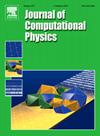Scalable resolvent analysis for three-dimensional flows
IF 3.8
2区 物理与天体物理
Q2 COMPUTER SCIENCE, INTERDISCIPLINARY APPLICATIONS
引用次数: 0
Abstract
Resolvent analysis is a powerful tool for studying coherent structures in turbulent flows. However, its application beyond canonical flows with symmetries that can be used to simplify the problem to inherently three-dimensional flows and other large systems has been hindered by the computational cost of computing resolvent modes. In particular, the CPU and memory requirements of state-of-the-art algorithms scale poorly with the problem dimension, i.e., the number of discrete degrees of freedom. In this paper, we present RSVD-Δt, a novel approach that overcomes these limitations by combining randomized singular value decomposition with an optimized time-stepping method for computing the action of the resolvent operator. Critically, the CPU cost and memory requirements of the algorithm scale linearly with the problem dimension. We develop additional strategies to minimize these costs and control errors. We validate the algorithm using a Ginzburg-Landau test problem and demonstrate RSVD-Δt's low cost and improved scaling using a three-dimensional discretization of a turbulent jet. Lastly, we use it to study the impact of low-speed streaks on the development of Kelvin-Helmholtz wavepackets in the jet via secondary stability analysis, a problem that would have been intractable using previous algorithms.
求助全文
约1分钟内获得全文
求助全文
来源期刊

Journal of Computational Physics
物理-计算机:跨学科应用
CiteScore
7.60
自引率
14.60%
发文量
763
审稿时长
5.8 months
期刊介绍:
Journal of Computational Physics thoroughly treats the computational aspects of physical problems, presenting techniques for the numerical solution of mathematical equations arising in all areas of physics. The journal seeks to emphasize methods that cross disciplinary boundaries.
The Journal of Computational Physics also publishes short notes of 4 pages or less (including figures, tables, and references but excluding title pages). Letters to the Editor commenting on articles already published in this Journal will also be considered. Neither notes nor letters should have an abstract.
 求助内容:
求助内容: 应助结果提醒方式:
应助结果提醒方式:


